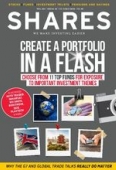Archived article
Please note that tax, investment, pension and ISA rules can change and the information and any views contained in this article may now be inaccurate.
The story behind this small cap investment trust’s consistent outperformance

Henderson Smaller Companies Investment Trust (HSL) is managed with aplomb by Janus Henderson’s Neil Hermon. He has outperformed the Numis Smaller Companies benchmark in thirteen of the last fourteen financial years.
Boasting £845m of assets under management, the trust aims to maximise shareholders’ total returns by investing in a portfolio of UK-quoted smaller companies. Hermon defines UK smaller companies as those found in the Numis Smaller Companies Index, a cohort of companies below £1.3bn in market value.
The trust’s latest results, covering the half year to November, revealed a 5.8% net asset value (NAV) total return compared to the 2.2% return from the benchmark, with Henderson Smaller Companies also raising the interim dividend by 20% to 6p. This built on the 20% increase in the dividend to 18p for the financial year ended 31 May 2017, which marked the company’s 14th consecutive year of dividend growth.
GROWTH, BUT GARP
‘Investing in equities is about growth,’ says Hermon, turning to the fund’s investment philosophy. ‘It is about the future, but we are growth with value. I remember the tech bubble – you have to have the bedrock of value.’
Hermon stresses the trust’s investment managers are very long-term in their approach, avoiding unnecessary portfolio turnover and with an average holding period of five years. ‘And we’re very much driven by meeting management teams,’ he continues, estimating that his team sits down one-to-one with around 400 companies per year.
Hermon will add stocks to the portfolio that have good growth prospects, sound financial characteristics and strong management, but at a valuation level that does not reflect these strengths. Likewise, he employs strong sell disciplines to dispose of stocks that fail to meet these criteria.
THE QUEST FOR QUALITY
Hermon is on a quest to buy quality companies with above-average growth potential. ‘We define the quality criteria by what we call the “4Ms”,’ says Hermon.
He looks at a company’s business model; its economic franchise, competitive advantage and pricing power. Secondly, he assesses the management team. Next is money, by which he means the strength of the balance sheet and cash flow. Last is earnings momentum – the ability to beat market expectations and maintain earnings growth into the future.
A prime example of a classic ‘4Ms’ stock is Victrex (VCT), the high-flying polymer specialist which Hermon notes ‘I’ve owned since day dot, since I rocked up here at Henderson in 2002’. A world leader in high performance polymer solutions focused on the automotive, aerospace, energy, electronics and medical markets, Victrex has ‘pricing power with high returns, is very well invested, has good cash flow characteristics and it also has momentum’ according to Hermon.
Scouring the market for quality stocks that are reasonably valued on a variety of metrics Hermon believes he will always be able to unearth value and add value among a small and mid-cap universe of 1,000 stocks.
‘Turnover is relatively low in our portfolio,’ he stresses. ‘We have about 100 stocks and we only add about 20 new stocks a year. We’ve got time to weed out these opportunities in the market.’
PORTFOLIO REPLENISHMENT
Initial public offerings (IPOs) are a good source of opportunities for Henderson Smaller Companies Trust, which has bought into seven new issues over the past 12 months and two so far in 2018.
These include IntegraFin (IHP), the company behind the Transact investment platform which ‘has a very good market position and is very profitable and cash generative’ and Team17 (TM17: AIM), the video games label behind the iconic Worms franchise. ‘The business generates a good amount of cash and we think it will exceed market expectations,’ Hermon says.
One of 2017’s IPO picks was TI Fluid Systems (TIFS). Despite being a global leader in the manufacture of highly engineered automotive fluid storage, carrying and delivery systems for light vehicles, TI Fluid Systems is according to Hermon ‘under-covered and under-owned, trades on sub-7 times earnings with a 10% free cash flow yield and a 4% dividend yield.’
DON’T CATCH FALLING KNIVES
Fervently-focused on quality, Hermon is at pains to point out ‘we don’t tend to catch falling knives – you get your fingers sliced off’. When the investment thesis for a stock does change materially, he’ll ruthlessly eject it from the portfolio.
Conviviality, the drinks distributor which collapsed earlier this year, was sold on the first out-of-the-blue earnings alert. ‘We felt that the profit warning was so fundamental to our investment case that we sold the shares immediately,’ recalls Hermon.
Despite a strong track record, the trust trades at a discount to net asset value. Hermon notes this discount is narrowing and says: ‘Maybe it is the perspective of illiquidity on the investments or the higher risk of smaller companies.’
Also weighing on sentiment towards smaller company trusts are the uncertainties arising from Brexit and the fragile UK consumer environment, but Hermon counters ‘we’ve got a pretty broad diversification of investments in the portfolio and around half of the portfolio company’s sales go into international markets.’
When Hermon inherited the trust, the dividend amounted to a mere 0.5p a share. ‘Now, fifteen years on, it is 19p per share. There’s been a 38-fold increase in the dividend over that time. It reflects the underlying growth at the companies I invest in. This is not a yield stock, but what you do get is very fast dividend growth,’ he explains. (JC)
Important information:
These articles are provided by Shares magazine which is published by AJ Bell Media, a part of AJ Bell. Shares is not written by AJ Bell.
Shares is provided for your general information and use and is not a personal recommendation to invest. It is not intended to be relied upon by you in making or not making any investment decisions. The investments referred to in these articles will not be suitable for all investors. If in doubt please seek appropriate independent financial advice.
Investors acting on the information in these articles do so at their own risk and AJ Bell Media and its staff do not accept liability for losses suffered by investors as a result of their investment decisions.
Issue contents
Big News
- Sopheon soars past share price expectations
- Predator may be first of many to circle Inmarsat
- Windows upgrade boon for Computacenter
- This week’s most important macro stories
- Profit margin fears dog housebuilders
- Why Playtech’s acquisition of Snaitech is a potential game-changer
- Jurassic-sized expectations for Frontier Developments

 magazine
magazine









